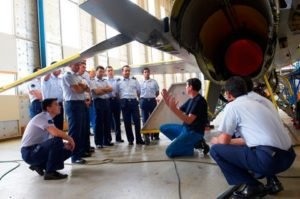Last updated on April 2nd, 2024 at 09:54 am
The modern airline industry has advanced quite a lot in the past few years, and yet there are some drawbacks in the industry that need to be fixed before it can realize its true potential. One such area of optimization and improvement in the airline industry is data collection.
Today the airline industry collects data on its planes through the use of 40 or more systems, and each of these are stored in different locations, owing to which there is no central database through which the entire flight system can be managed at the same time. This process of data collection not only leads to mismanagement but also a huge cost incurred due to the maintenance of multiple systems, sometimes by competitors in the same industry.
A Decentralized Management System
The use of blockchain technology in the airline industry can prove to be beneficial and helpful across many different sectors. For example, at present, when a plane is serviced or repaired, multiple systems capture the state of the new components being installed, but often this data is not accurate.
 On the other hand, if a digital ledger is created through blockchain training, it can take a snapshot each time a component is replaced or repaired, along with the credentials of the manufacturer, assembler, and technician. Through this snapshot, a real-time clone of the component can be created, which can then be monitored to understand the overall condition of the system.
On the other hand, if a digital ledger is created through blockchain training, it can take a snapshot each time a component is replaced or repaired, along with the credentials of the manufacturer, assembler, and technician. Through this snapshot, a real-time clone of the component can be created, which can then be monitored to understand the overall condition of the system.
And the application of blockchain doesn’t stop here. Following the above-mentioned example, the same principle can be applied to each and every component of the airplane, thus facilitating the overall monitoring of the entire system at all points in time.
Implemented at a large scale, the application of this system can help in:
- Significantly reducing the overall cost of maintaining airplanes and also reduce the amount of downtime due to unplanned maintenance.
- It can significantly increase the value of planes when being sold in the secondhand market, as a clear real-time snapshot of the entire system can be shared with the buyer immediately.
- Increasing the productivity of workers, both in maintenance as well as in manufacturing, as the overall system will work in a much more controlled, efficient, and timely manner.
Areas of Improvement
Although the larger impact of blockchain implementation on the airline industry is yet to be estimated, there are three main areas where the immediate benefits can be witnessed.
Maintenance
- Efficiency: With the implementation of blockchain technology, the current time spent by professionals on routine maintenance and inspection will be drastically reduced.

- Defeating Duplicacy: A common issue with the airline’s spare parts industry is the fact that often buyers are duped via duplicate parts. With the implementation of blockchain, buyers can immediately compare their products to a ledger and thus confirm authenticity.
Finance
- Increased Value in Reselling: Due to the absence of a real-time maintenance record, the price of airplanes in the secondary market is often less as the actual condition of the plane and its components cannot be correctly estimated. With blockchain technology and the creation of a real-time ledger, this issue can be immediately addressed.
Workforce
Every year, the airline industry employs hundreds and thousands of professionals around the world, and while there is a system to maintain them, a system of verification and identification is absent. With the implementation of blockchain technology, a ledger of personnel can also be included, which will assist in better monitoring and overall management.
Conclusion
The right implementation of blockchain technology can create many benefits for the global airline industry and thus if you want a blockchain career in the airlines industry now is the time to start.

